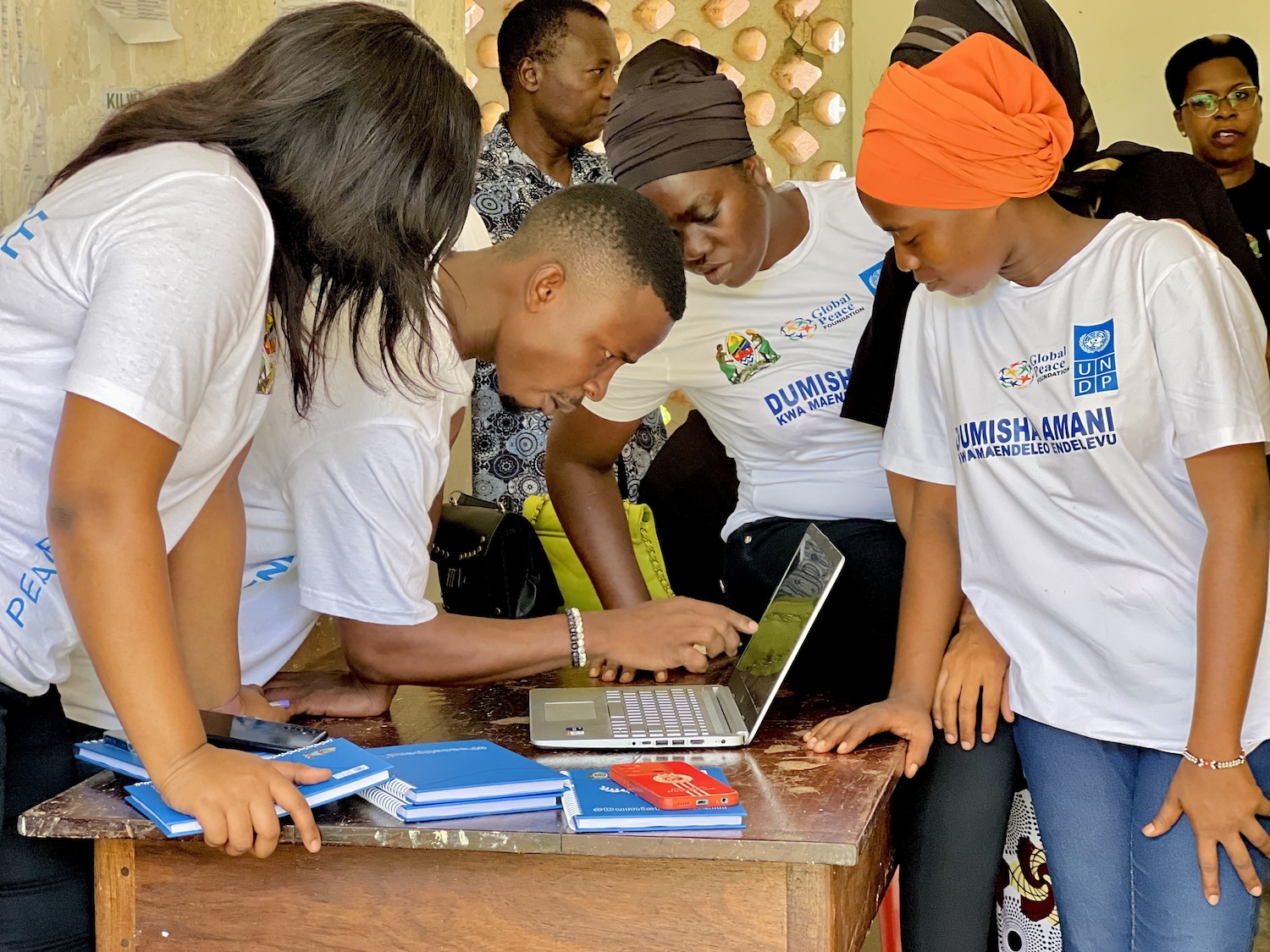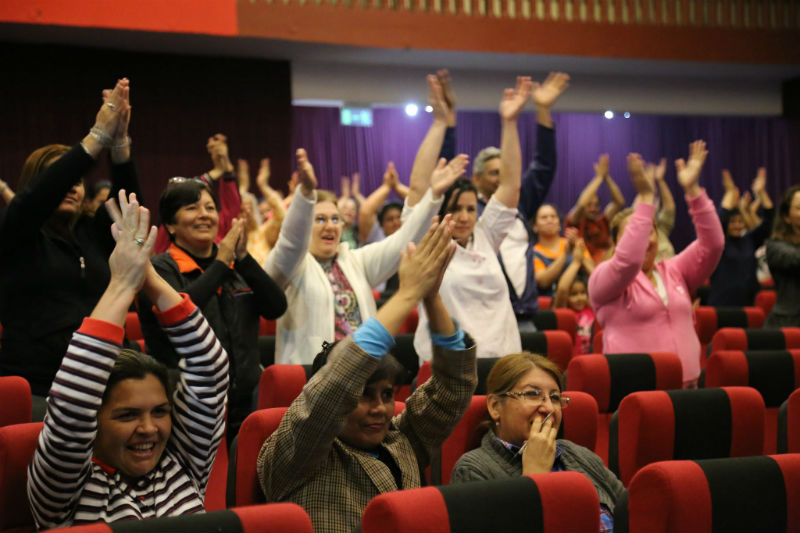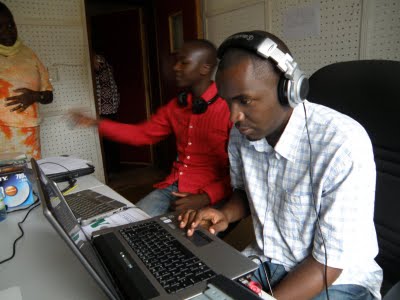
A community radio station in Nairobi. GLOBAL INTEGRITY COMMONS
“I was responsible for breaking news stories from all over the country. Seeing the raw footage, I couldn’t come to terms with what was happening,” said Kenyan television producer Tim Jeru, reflecting on the ethnic violence that convulsed the nation following the disputed 2007 election.
Jeru and other leading Kenyan reporters and producers addressed the role of the media during times of crisis at a compelling forum, “Media Freedom, Responsibility and the Challenge to National Integration,” in Nairobi during the Global Peace Convention in November 2010, organized by the Global Peace Foundation, founded by Dr. Hyun Jin Moon.
What responsibility do media have in reporting events that could further escalate violence? What is the boundary between journalistic ethics and national unity in a time of crisis? How is reporting influenced by personal bias, commercial interests, or lack of training in journalistic ethics? These and other questions were addressed at the forum, hosted as part of the 2010 Global Peace Convention, “Conflict Resolution, Peace and Development,” and drew comparisons to media coverage during the September 11, 2001 terrorist attacks in New York City.
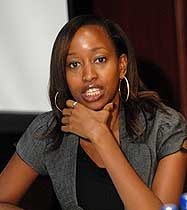
News reporter Janet Mbugua
Former Kenya News Service anchor Janet Mbugua, now a reporter in South Africa, recalled the personal challenge of meeting professional obligations as a news reporter. “It was difficult to go to the office,” she remembered. “Right outside our gate, I’m Kikuyu, and we heard the shouting of a mob with machetes, ‘We want the blood of Kikuyus!’ I remember standing on the balcony with my mom and thinking, ‘Is this really happening in Kenya?’ The office was calling for me to come in but I was locked up at home. I tried to get out, but they were right there. Then my older brother said I’ll take you, and he drove like a maniac and finally I got there in front of the camera.
“It was difficult time, a sense of sadness, a sense of shame, a sense of confusion. What we saw was graphic footage of people being hacked, people being stoned, people being tortured, childrens’ charred bodies, women screaming with their dead babies. That’s what we had to deal with before we went on air.”
Crisis and media ethics
“Prior to the election we saw a very polarized society, with strong political interests,” said Paul Melley, deputy chairman of Standard Media Group in Kenya. He noted that media in Kenya is a very young profession with very little experience dealing with a highly sensitive and explosive political environment. “The media took the position of claiming that party A would win the election and party B would have difficulty winning the election. We then started reporting the results the way we expected the votes to fall.
“Did we exacerbate a delicate situation in manner we reported?” Melley reflected. “We could have. At the same time, without media it would have been impossible to know what was going on in the country. It would have been difficult to bring political pressure on principals that were eventually forced by pressure of public opinion to come to a political settlement. In this sense media played a positive role.
“At a critical hour the media took the position that was summed up in one headline: ‘Save Our Country.’
I still remember that headline. Something changed dramatically in how the events were seen and it put pressure on the two leaders so that they had no option but to work together. On a front page editorial, we made a clear call for the two leaders to work together. On that side we made a positive contribution.”
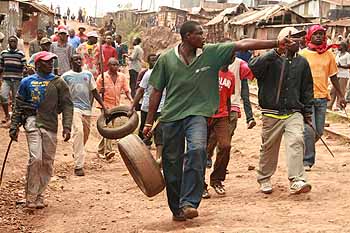
Post-election rioting in Nairobi. The crisis challenged media to report on the violence without further inciting ethnic divisions. IRIN
Mike Wachira from the Center for Rights, Education and Awareness said that during the violence many fingers were pointing at community radio stations. “But it is a huge mistake to confuse community radio with vernacular,” he said. “While all community radio is vernacular not all vernacular is community radio. What they’re pointing fingers at are community radio that is broadcasting in vernacular language. The reality is many who are broadcasting are not trained; they don’t understand issues of ethics. Mobile phones drove a lot of coverage to vernacular stations, which drive up ratings. If private stations want to hire, they don’t necessarily look at experience or professionalism, they look at good voice, can he connect with community and drive up ratings.”
Panelists believed that media in Kenya matured during the crisis and that media played a positive role in the recent referendum adopting a new Constitution. “What I saw this year during the referendum was very refreshing,” Mbugua said. “Coming from Johannesburg and watching the Kenyan media, I was saying to myself, ‘please let’s try to be peaceful, please let’s stand together, please let’s not repeat what happened in 2007.’
“Were going into 2012 [and the next presidential election] and I know that people are skeptical. But I really don’t want to believe that we are going back. I hope that we have learned tolerance and reconciliation, not just talk about it but practice it.”


